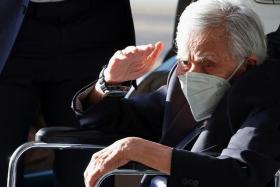Suicide of worker who had Covid-19 may ‘haunt his three children for years’
Wife of man who had Covid-19 urges migrant workers here not to do anything drastic and return home safe
The three girls had thought their father died in an accident.
Last week, they found out that Mr Alagu Periyakaruppan, 46, had killed himself, a traumatic discovery that could haunt them for years.
Last Friday, State Coroner Kamala Ponnampalam ruled the Indian national's death as a suicide. He had been a construction worker here since 2009.
On April 19, he was admitted to Khoo Teck Puat Hospital (KTPH) for a fever and headache, and later tested positive for Covid-19.
Five days later, in the pre-dawn hours of April 23, he recorded two videos on his mobile phone, one of which explained what he was going to do. He then removed a glass pane from a window, climbed through it and fell to his death.
The family was informed of the coroner's inquiry findings by a volunteer from migrant worker social enterprise ItsRainingRaincoats last Friday.
Speaking to The New Paper in Tamil through the volunteer, Mr Alagu's wife, Madam A. Panjali, 40, said the family, who lives in a village in the Andaman Islands, India, is struggling with the news.
"We don't understand why he would do this. He was a very caring husband and father," she said.
She added that their two older daughters, aged 16 and 11, were inconsolable while the youngest, six, is too young to grasp what has happened.
Clinical psychologist Carol Balhetchet told TNP that while adults will struggle with the loss of a loved one through suicide, the children will often turn the blame on themselves.
She said: "Young children whose parents die by suicide will intensely question if they were the cause, with thoughts like 'we were too much trouble' or 'he didn't want us'."
"They take on the burden of accountability and blame by internalising the helplessness of being unable to stop the suicide or remedy it."
She added that Mr Alagu's daughters may never come to terms with the tragedy.
"The poor children will be having nightmares and will struggle to rationalise what their father has done. They will keep questioning why he left them, even as they grow up."
State Coroner Kamala described Mr Alagu's suicide as one that was not predictable nor preventable.
He did not show any suicidal tendencies, and the hospital had engaged him to explain his Covid-19 condition.
The staff described him as quiet, pleasant and helpful, often assisting to distribute meals to others.
He had no complications from the disease and was on track to be transferred to a community facility.
A committee convened by KTPH to look into the death found that while Mr Alagu worried about his daughters and financial future, these were common concerns faced by many of the migrant worker patients.
His nephew, who worked for the same employer and lived in the same dorm, said Mr Alagu called him on April 21 to ask him to help take care of his family and ensure his children receive a good education.
Feeling something was amiss, he probed his uncle further, but Mr Alagu would only said that everything was all right as he would recover soon.
Two days later, Mr Alagu's body was found with no pulse at an open-air staircase landing on the third storey of the hospital. He was pronounced dead at 7.15am.
An autopsy found his injuries to be consistent with those caused by a fall from height.
State Coroner Kamala said that detecting suicide risk was "extremely difficult" and extended her condolences to Mr Alagu's family.
Dr Balhetchet said the family must rally together to help the children, which includes telling them that they are not to blame.
"The ones most impacted by suicide are the ones left behind, and it might be quite a while before this family can be emotionally stable," she added.
Madam Panjali urged other migrant workers here to think of their families back home.
"No one should do anything like this, no matter what the difficulties are," she said.
"Please come back safely to your families and children."
HELPLINES
Migrant Workers' Centre (24-hour helpline): 6536-2692
Transient Workers Count Too: 6297-7564
Humanitarian Organisation for Migration Economics: 6341-5535
HealthServe: +65-3138-4443
Samaritans of Singapore: 1800-221-4444
Singapore Association for Mental Health: 1800-283-7019
Institute of Mental Health helpline: 6389-2222
Care Corner Counselling Centre (Mandarin): 1800-353-5800
Tinkle Friend: 1800-274-4788
Get The New Paper on your phone with the free TNP app. Download from the Apple App Store or Google Play Store now



